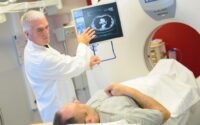I awoke with a full-body itch — it was a rare symptom of cancer
Barbara Green awoke in the middle of the night after an intense itchiness washed over her.
It was July 2022, and the now-79-year-old had lived a healthy, active lifestyle. Yet, the mysterious itch — much like “a bug bite that’s spread to your entire body” — was driving her nuts.
The Falls Church, Virginia, resident told Today that she booked an appointment with her primary care physician, describing other abnormal symptoms, such as light-colored stools and dark urine, along with the bothersome itches.
“I thought the doctor was going to think I was a nut case for coming in because I was itchy,” she told Today.
But her blood results revealed alarmingly high liver enzyme levels while a CT scan unveiled a growth on her pancreas. She was soon diagnosed with stage 4 pancreatic cancer, which had spread to other areas of her abdomen.
She was told she only had eight to 11 months to live.
“I had no idea there was anything wrong with me. I thought I was perfectly fine,” said Green, whose family is, to her knowledge, cancer-free.
“Everybody else seems to realize that pancreatic cancer is deadly. I didn’t even know that,” she added.

Excessive itchiness is not a common symptom of pancreatic cancer. However, it can be associated with jaundice, the yellowing of the skin and whites of the eyes, caused by a build-up of bile salts in the blood when the liver is not properly functioning, according to the Pancreatic Cancer Action. And when the pancreas isn’t doing its job, the liver can’t either.
Other symptoms of pancreatic cancer include abdominal or back pain, indigestion, loss of appetite, nausea or vomiting, fatigue and weight loss.
Green was shocked — and thankful — her doctor listened to her symptoms and didn’t write her off.
“I’m not sure all doctors would have picked up on this. I think some of them might have dismissed me as a nut case,” she said.
Because Green couldn’t undergo surgery due to the cancer spreading, she began chemotherapy and, despite the odds, her cancer responded and shrunk. By last month, the tumor was small enough to be barely visible, and Green began oral medications instead of infusions.

While neither she nor her doctors know exactly how much longer she has left to live, she’s no longer “dying on schedule,” she said.
“It’s an odd situation to be in when you are prepared to die, but one day you wake up and think, I’m not dead,” she said. “Then you have to go back to thinking, I probably should go to the dentist.”


